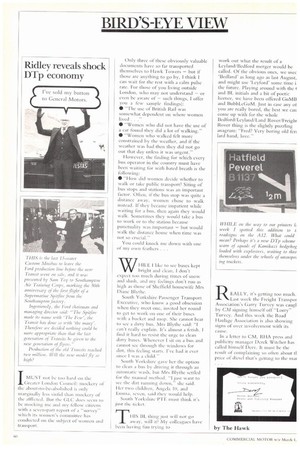Ridley reveals shock DTp economy
Page 60

If you've noticed an error in this article please click here to report it so we can fix it.
IMUST not be too hard on the Greater London Council: mockery oldie about-to-be-abolished is only marginally less sinful than mockery of die afflicted. But the GLC does seem to be mocking me and my fellow Citi7ellS with a seven-part report of a "survey'' whichits women's committee has conducted on the subject of women and transport. Only three of these obviously valuable documents have so far transported themselves to I lawk Towers — but if those are anything to go by, I think I can wait for the rest with a calm pulse rate. For those of you living outside London, who may not understand — or even be aware of — such things. I offer you a few sample findings):
• "The use of British Rail was somewhat dependent on where women lived • "Women who did not have the use of a car found they did a lot of walking."
• "Women who walked felt more constrained by the weather, and if the weather was bad then they did not go out that day unless it was urgent."
However, the finding for which every bus operator in the country must have been waiting for with bated breath is the following: • "How did women decide whether to walk or take public transport? Siting of bus stops and stations was an important factor. Often, if the bus stop was quite a distance away, women chose to walk instead. If they became impatient while waiting for a bus, then again they would walk. Sometimes they would take a bus to work or to the station because punctuality was important — but would walk the distance home when time was not so crucial."
You could knock me down with one of my own feathers . .
WI IILE I like to see buses kept bright and clean, I don't expc. t too much during times of snow and slush, and my feelings don't run as high as those of Sheffield housewife Mrs Diane Blythe.
South Yorkshire Passenger Transport Executive, who know a good obsession when they meet one, invited her round to get to work on one of their buses with a bucket and mop. She cannot bear to see a dirty bus. Mrs Blythe said: "I can't really explain. It's almost a fetish. I find it hard to resist the urge to clean dirty buses. Whenever I sit on a bus and cannot see through the windows for dirt, this feeling starts. I've had it ever since I was a child.
South Yorkshire gave her the option to clean a bus by driving it through an automatic wash, but Mrs Blythe settled for the manual method. "[ just want to see the dirt running down.she said. Her two children. Angela 10, and Ennui, seven, said they would help.
South Yorkshire PTE must think it's just the ticket.
THIS BL thing just will not go .iway, will it? My colleagues have been having fun trying to work out what the result of a Leyland/Bedford merger would he called. Of the obvious ones, we usec 'Bedland' as long ago as last August, and might use 'Leyford' some time the future. Playing around with the I and BL initials and a bit of poetic licence, we have been offered GuMB and BubbLeGuM. just in case any of you are really bored, the best we can come up with for the whole Bedford/Leyland/Land Rover/Freighi Rover thing is the slightly puzzling anagram: "Fred? Very boring old fi:ri lard hand, love.
WHILE on the way to our printers h week I spotted this addition to 1, roadsigns on the Al2. What could mean? Perhaps it's a new DTp scheme warn of squads of Kamikazi hedgehog loaded with explosive's, waiting to thro themselves under the wheels of unsuspee ing truckers.
REALLY, it's getting too much. Last week the Freight Transpot Association's Garry 'Iurvey was caugl by CM signing himself off "Lorry" Turvey. And this week the Road Haulage Association is also showing signs of over involvement with its cause.
In a letter to CM, RHA press and publicity manager Derek Witcher has called himself Derv. It must be the result of complaining so often about tl price of diesel that's getting to the mai . . .
by The Hawk




























































